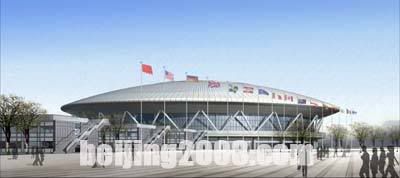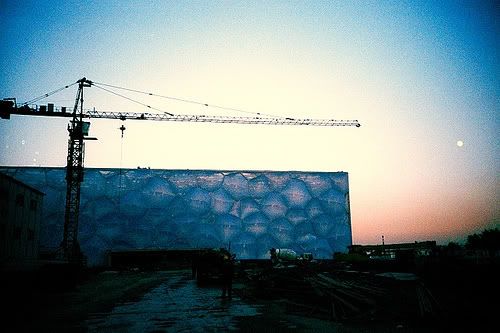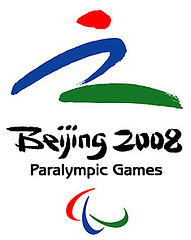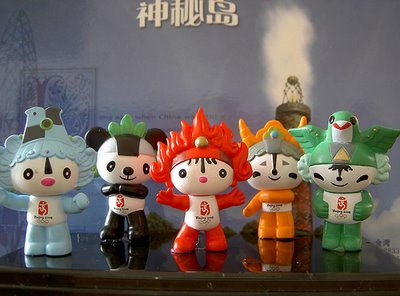Friday, October 20, 2006
The Chinese really know how to make money!
"Domains and email addresses for 2008 Olympics mascot fetch high price on Taobao
Shanghai. October 17 INTERFAX-CHINA -
The official mascots of the Beijing 2008 Olympic Games, previously named "The Five Friendlies", were renamed "Fuwa" on October 9 causing Fuwa-related email addresses and domains to go on sale at Taobao.com for high prices.
According to a Shaanxi local newspaper, Hua Shang Chen Bao, a reseller "xiyanyan" was the owner of most of the domains. He successfully sold a domain, chinafuwa.com, for RMB 80,000 (USD 10,000), but was said to regret not holding out for a higher price.
However, according to Hua Shang Chen Bao and Beijing Times, China's network information center CNNIC and the Beijing Organizing Committee for the Games of the XXIX Olympiad (BOCOG) had differing views on the matter.
CNNIC said in October that the domain registration rule was "whoever applies first wins" and that domain names can be traded freely.
But according to Beijing Times, BOCOG said the transactions violated the Regulations on the Protection of the Olympic Logo, which was issued by the Trademark Office of the State Administration For Industry & Commerce, responsible for the registration and administration of trademarks.
Beijing Times reported that Taobao.com didn't prohibit the domain auction activities because CNNIC allowed domain transactions. However, after they contacted the BOCOG, Taobao decided to delete the related webpages after 6 p.m., October 17.
Beijing Times said "xiyanyan" registered these domains one year ago. After October 15, 2006, he began to receive more and more inquiries, and over ten phone calls a day.
On the afternoon of October 16, "xiyanyan" suddenly suspended the sales of these domains, saying he would wait until the price went up to a higher level. As a result, chinafuwa.net, china-fuwa.com, and fuwachina.com temporarily disappeared from Taobao.
Currently, three email addresses, fuwa.bj2008@gmail.com, bj2008.fuwa@163.com, fuwamother@yahoo.com.cn and three domains, five-fuwa.cn, fuwa-beijing2008.com and fuwa-beijing2008.net are still waiting for buyers on Taobao.
The owner of fuwa-beijing2008.com, who is from Quanzhou, Fujian province, is asking for RMB 500,000 (USD 62,500) for the domain. And fuwa.bj2008@gmail.com is the most valuable email address with the owner asking RMB 2,000 (USD 250).
Before the "Five Friendlies" were renamed, fivefriendlies.com was also waiting for buyers. "
Such an easy way to make a quick buck!
Thursday, October 19, 2006
The Olympic Rehearsal
"2008.sina.com.cn
By Li Ai
On 19th Apr 2008, The International Athletes Federation’s Walkathon Competition will be held at the National Stadium aka Bird Nest. This will be the FIRST international event ever to use the stadium. Yesterday, the Beijing Olympic Committee announced at its website the schedule for the series of competitions collectively known as “Good Luck Beijing 2008”. This is the series of events that will test all the Olympic venues in areas of infrastructure, service system process and competition organization process.
“Good Luck Beijing 2008” is the rehearsal and practice for the stadiums ahead of the Olympics. It begins on 1st Aug 2007 and will progress through all the stadiums. As the main venue for the games, the National Stadium (Bird Nest) is estimated to be completed by end of 2007. It will be revealed before the World on 19th April 2008 as the Walkathon begins. The National Aquatic Center will also be put into use for the first time in Feb 2008.
According to the Beijing Olympics Committee correspondent, starting from the second half of 2007, all venues will be hosting events to verify and validate their infrastructure and competition management process as part of the rehearsal for the Beijing Olympics. "
To think that 4 years ago in Greece, they were still doing the landscaping when the games started.
Labels: Planning Process
Wednesday, October 18, 2006
Top of the World, Anyone?

"MONACO, Oct 17, 2006 (AFP) - The Olympic flame could pass by Mt Everest, the world's highest mountain, en route to Beijing, organisers of the 2008 Summer Games announced on Tuesday. ``We're planning to take the Olympic flame to Mount Everest, it's a project we're studying,'' spokesman Yang Binyuan said here. The move could be seen as a highly contentious one given that most of the Himalayan mountain range lies within Tibet, a region ruled by China since it sent in the military to ``liberate'' the Himalayan region in 1950. Mt Everest, standing 8,848 metres (29,028 feet) high, lies on Nepal's border with Tibet, which international rights groups accuse the Chinese of ruling through repression and military intimidation. Yang confirmed that construction of the 37 sporting infrastructures, including 31 in Beijing, being built for the Games would be finished by the end of 2007. Once the sites are finished, the organisers plan to host around 40 test events, including the Paralympic Games. Two have already taken place at the Beijing softball centre and sailing in Qingdao. AFP"
Whoa! For your information, in Chinese, Mt Everest is called 朱穆拉马烽 (Zhu Mu La Ma Feng). I believe it's derived from the Tibetian name for the mountain which means "Mother of the Universe".
Labels: Planning Process
Yum yum!
"Chinese cuisines recommended for Beijing Olympic menu
www.chinaview.cn 2006-10-18 16:49:45
XI'AN, Shaanxi Province, Oct. 18 (Xinhua) -- Nearly 100 cuisines from all over China were recommended to be listed in the Beijing Olympics menu and made their appearance in an Expo here on Wednesday.
Yak steak, Malan Noodle, Mushroom soup are among the cuisines from all parts of China and many of the 30,000 visitors of the Chinese Catering Industry Expo showed interest in them which only account part of the recommended menu for the 2008 Games.
Organizers said the China Cuisine Association have been busy with choosing suitable food for athletes, officials, journalists as well as spectators during the Games two years away.
Asked by the Beijing Olympics organizers at the beginning of this year to help with the Olympic menu, the association will make recommendations to the BOCOG and Olympic service providers, Expo organizers said. "
Personally, I like Peking Duck, Xiao LongBao (soup dumplings) and various dim sum. I believe that they will be serving these as well! :)
Labels: Planning Process
Tuesday, October 17, 2006
The Water Cube Revolution
Looks almost done from this side yah! :) I wonder if they will illuminate it in different colors like the Allianz Arena (pictured last).



Labels: Venues
Monday, October 16, 2006
Chinglish
"Sunday, October 15, 2006
Drive Launched To Correct Bad English Ahead Of Beijing 2008
Posted 10:23 am ET (GamesBids.com)
A new drive has been launched to correct bad English in China ahead of the Beijing 2008 Summer Olympic Games.
Although there have been previous attempts to wipe out what is called “Chinglish” phrases often seen on Chinese street signs and product labels, they have not been successful.
Examples of Chinglish range from emergency exists at Beijing airport which read “no entry on peacetime”, a road sign on Beijing’s Avenue of Eternal Peace warning of a dangerous pavement says, “to take notice of safe; the slippery are very crafty” and menus which list such items as “corrugated iron beef”, “government abuse chicken”, and “chop the strange fish”.
Xinhua reports that Beijing city authorities will issue new translation guides by the end of the year. Booklets would be handed out to hotels and shopping malls, on public transit, and at tourist attractions.
Mistranslations reportedly happen because many Chinese words express concepts obliquely and can be interpreted in multiple ways, making translation a minefield for non-English speakers.
A month after being awarded the 2008 Games in 2001 Beijing’s municipal government attempted to stamp out the problem and a year later the Beijing Tourism Bureau set up a hotline for visitors and residents to monitor complaints about bad English. The bureau said a panel of English professors and expatriates would review results."
A classic example.

Sunday, October 15, 2006
You'd make a great investment with these coins!

"Olympic commemorative coins: age-old dream cast in
Last Updated(Beijing Time):2006-10-11 09:10
By Jin Xuan
On 20 September, the People's Bank of China issued the First Set of Precious Metal Commemorative Coins for 29th Olympic Games worldwide, which is the only official program for precious metal commemorative coins issuing for Beijing 2008 Olympic Games. The unveiling of this set of coins must lead to a surge of Olympic coins collection nationwide.
It has been a long time to release commemorative coins for the Olympic Games, which has now been regarded as an international practice.
According to ancient Greeks, issuance of souvenirs to absentees of the Olympic Games can shorten the distance between the public and the Olympic Movement. The issuance of golden and silver commemorative coins on the Olympic theme can be traced back to B.C.420 with a history of over a thousand years. These coins are called as commemorative coins for ancient Olympic Games by collectors.
Golden and silver commemorative coins for Modern Olympic Games emerged over 50 years later than the reviving of Modern Olympic Games. In 1896, the very first Modern Olympic Games was held in Athens, which is the symbol of the official emergence of Modern Olympic Movement. In 1951, a silver coin engraved with five Olympic rings was issued to commemorate the 15th Olympic Games held in Helsinki, bearing a face value of 500 Finnish Marks.
To commemorate the 29th Olympic Games to be held in Beijing, carry forward Olympic spirit and advocate Chinese age-old and splendid culture, having been approved by International Olympic Committee and Beijing Organizing Committee for the Games of the XXIX Olympiad (BOCOG), the People's Bank of China will issue three sets of precious metal commemorative coins for 2008 Olympic Games between 2006 and 2008. One set is scheduled for release every year. This is the only official program of precious metal commemorative coins for 2008 Olympic Games.
The first set of precious metal commemorative coins for the 29th Olympic Games consists of two gold coins and 4 silver coins. The coin's design embodies Chinese age-old sports culture and national characteristics, which might be called as the choicest coin.
The common obverse design for the gold and silver coins features the traditional paired "Chinese Dragon" image, the 29th Olympic Games emblem, the name of the country and the year.
The reverse design for the gold coins, mainly with athletic sports as the theme, taking the image of sports movement derived from Chinese ancient sports culture as major scene, including equestrianism and toxophily with a span from Dong Han, Bei Zhou, Sui, Yuan to Ming Dynasties, nearly 1600 years. Opposite to the historical sportsman is the image of sports items of the 29th Olympic Games. The overall design features the image of Chinese age-old Wadang, with body of the face overlapping with the margin of Wadang, making the face of coin vivid and lively. The reverse design is characterized by Chinese national style, representing Chinese age-old sports culture.
The reverse design of silver coins focuses on lively, brisk, lovely and enchanting Children's folk games, taking scenes on four typical Children's games like flying kite, jumping goat, rolling hoop and kicking shuttlecock as the theme of the coin. The actions of Children's games are shown exaggeratively, powerfully and beautifully like rising sun. The one third of right side of the scene is divided by a Chinese knot, accompanied by such colored toy-like pattern as pinwheel, rabbit figurine, paired-fish hang decoration and cloth made tiger as right wings, joyously energetic. The brisk and lively style of the whole set of silver coins and partial color technology make people feel fresh.
In respect of technology, the obverse of coins introduces mirror background technology,while image, rim, name of the country and the year introduces sand blast and counter sand blast technology respectively highlighting cultural relic like simplicity and unsophistication and vicissitudes of life. The reverse design introduces multi-layer sand blast technology embodying the eyes expression and rich finery of the character. The reverse of the silver coin introduces partially colour devolve printing technology with precise colors and high resolution. The signs for manufacturers are marked with micro character printing technology to improve anti-counterfeit function. (signs of manufacturers: S,Y and Z refer to Shanghai Mint, Shenyang Mint and Shenzhen Guobao Mint respectively.)
The certificate of commemorative coins features ancient Chinese dragon, Beijing Great Wall Beacon Tower (for Gold coin certificate of authenticity), Qinian Hall of Beijing Temple of Heaven (for silver coin certificate of authenticity), Peony and emblem of the 29th Olympic Games, with profound meanings and national characteristics. The certificate printing uses anti-counterfeit technology with high security effectiveness. In addition, coins are accompanied by collection instruction and certificate cover.
The coin's packaging design also highlights Chinese characteristics. Each set of 1 ounce silver coin consists of 4 individual package boxes, which can be integrated into a Peking opera mask pattern of Dianwei. The boxes for the set of 4 Silver coins and boxes for 2 gold and 4 silver coin package introduce Chinese traditional penthouse-like streamline style.
Internationally, most Olympic coins have had a large increase in value after their issuance and been favored by numismatic investors. For example, after over 50 years of preservation, Helsinki Olympic coins issued in Finland in 1951, has been increased in value by more than 30 times, from 18 Euros to 665 Euros; the value of the silver coin with image of High Jump among Atlanta Olympic coins had a four-fold increase to 186 Euros in 2003 from issuing price of 49 Euros in 1996; the first silver coin released in Greece in 2003 for the Athens Olympic Games has an increase up to 95 Euros from issuing price of 70 Euros, which gold coin up to 700 Euros from 499 Euros; In China, the silver commemorative coin for the success of Beijing's bidding for 2008 Olympic Games has had a large increase in value from 220 yuan of issuing price to the latest market price of 1650 yuan. (whoa!)
The First Set of Precious Metal Commemorative Coins for 29th Olympic Games is distributed by China Gold Coin Incorporation, exclusive enterprise for precious metal commemorative coins directly under the People's Bank of China. According to estimates by numismaticians, the national characteristic embodied in the coin design is sure to lead to a worldwide surge of collecting precious metal commemorative coins for the 29th Olympic Games, in the context of worldwide rising passion about Chinese culture. "



Lao Shan Velodrome
This is going to be the cycling (track) stadium. It can hold 6000 people. The construction photo is dated.
Labels: Venues
Don't you think some of these are creative? :)
A more neutral stance in this report. Don't you think some of these measures are creative? ;)
"BEIJING (AP) - Beijing is considering hospitalizing the mentally ill, relaxing restrictions on religious services and giving many businesses and factories a holiday, among contingency measures for the 2008 Olympics.
The city office overseeing Olympic preparations discussed dozens of contingency measures needed for the Games at an internal meeting Thursday, from limits on the use of cars to banning the posting of handbills around the city, the state-run Beijing Morning Post said Friday.
Among the measures discussed, the newspaper said, were shutting down heavily polluting factories to clean up the air, giving most Beijing residents a 16-day holiday to alleviate traffic and allowing foreigners to worship in groups, which is officially outlawed, although the ban is rarely enforced.
A spokesman for the Beijing 2008 Olympic Environmental and Construction Headquarters Office, which conducted the meeting, confirmed the newspaper report but stressed no decisions have been made. "Everything is still under discussion," said spokesman Zhou Jiawang.
Chinese leaders have staked the country's prestige on running a successful Games and raised expectations in the sports and business worlds that the event will set a new standard for the Olympic movement. But the city often chokes with pollution and is gridlocked in standstill traffic, posing logistical and planning challenges.
City officials and the Beijing Olympic organizing committee, known as BOCOG, have previously said that a host of contingency plans were being looked at to deal with pollution and traffic and ensure Chinese regulations comply with international norms during the Games. The Beijing Morning Post report was the most detailed glimpse yet of the range of issues.
More controversially, the newspaper also said that the city was considering hospitalizing all mentally ill people "to avoid creating any harm to society" and expelling many of the city's one million migrant workers.
Zhou denied that such a wide-scale expulsion order was on the table. He said ordering out the migrants was proposed by one of the advisers at the meeting, but that the newspaper report was incorrect. At first he said that his office would issue a clarification later but then said it would be done by the city government. The city government's press office said it did not know when the statement would be released.
The confusion underscores the sensitivities human-rights issues hold for China in its Olympic ambitions. Chinese leaders have promised that hosting the Olympics will improve respect for human rights. Privately, International Olympic Committee officials have warned Beijing officials that excessive social controls could mar the Games.
Beijing has previously enacted extraordinary measures to reduce the chances of protest or spruce up the grimy capital's appearance. In 1993, during its failed bid for the 2000 Olympics, Beijing expelled beggars, forced the handicapped to stay at home and closed smokestack industries when International Olympic Commission inspection teams visited.
Some of the contingencies deal with legalities. While the city has the authority to shut down heavily polluting factories on days of high pollution, it does not have the power to do so for the sake of a major event, the Beijing Morning Post said. Visa requirements must also be waived to allow Olympic Games participants visa-free entry to China.
To deal with the traffic congestion, the city may limit cars to driving every other day, with licence plates ending in odd numbers allowed on some days and those with even numbers on the others, the report said. Olympic event ticket-holders would be allowed free rides on public transport to encourage them not to drive, the newspaper said." - 15th Sep 2006, Canadian Press
A Green Olympics in Beijing?
"Back in 2000, China was able to win the coveted right to host the summer Olympics in 2008 because it claimed that the Games would be “green.” Since then, the central government has been busily mapping an ambitious environmental protection plan to build gas-fired power plants, plant more trees, and improve the city’s air quality.
In late September, China’s Olympic Organizing Committee announced that the government may grant all of Beijing’s residents 16 days paid vacation during the Games, which start on August 8, 2008. “This is because the Games have a special requirement for the air quality,” said the committee.
This will enable the city to shut factories and businesses during the Games and keep thousands of cars off the streets. In addition, the government will close down “backstreet beauty salons,” China’s euphemism for houses of prostitution. Beijing will also likely expel about one million migrant workers from the capital city, some of whom are likely the same ones helping to build the Olympic facilities.
Even weirder is this: Chinese citizens from other provinces or cities will need approval from their local governments if they want to travel to Beijing during the Games, a move reminiscent of the Cultural Revolution (1966-1976) when China enforced similar laws that restricted travel within the country. Given all these measures, Beijing may not need other environmental protection regulations, as it appears the city will be shutting down in order to run the Games and comply with the environmental decrees.
All this demonstrates what has been known for a long time: in China, the number-one problem facing environmental protection is, in fact, the government. By ignoring the massive pollution problems caused by coal-burning power plants, the government has tacitly endorsed that pollution. China’s top legislature, the National People’s Congress (NPC), has openly admitted that 400 Chinese cities were hit by acid rain in the first half of this year. The NPC acknowledged the rapid deterioration of the country’s air and water quality, noting that the country’s sulfur dioxide emissions have risen by 27 percent since 2000, reaching some 25.5 million tons in 2005, twice the acceptable volume. China is the world’s biggest sulfur dioxide polluter. " - from Energy Tribune, 13 Oct 2006
At first, I don't know if this report is true but I saw other reports on the web saying basically the same thing. However, they stressed that these are just CONTIGENCY measures. It's a well known fact that many Chinese cities are heavily polluted. In fact, there has been reports of people who died running marathons in Beijing due to respiratory problems. Well, I think this must have in part to do with the air quality in Beijing.
The dust storms from the Gobi Desert is a huge threat too. In fact, Beijing is keeping count on the number of clear sky days and aims to hit around 150 days of clear day last year. Hopefully, they can resolve their pollution problems because no matter how grandiose the place is, it's not pretty when athletes all can't perform because of bad air.





